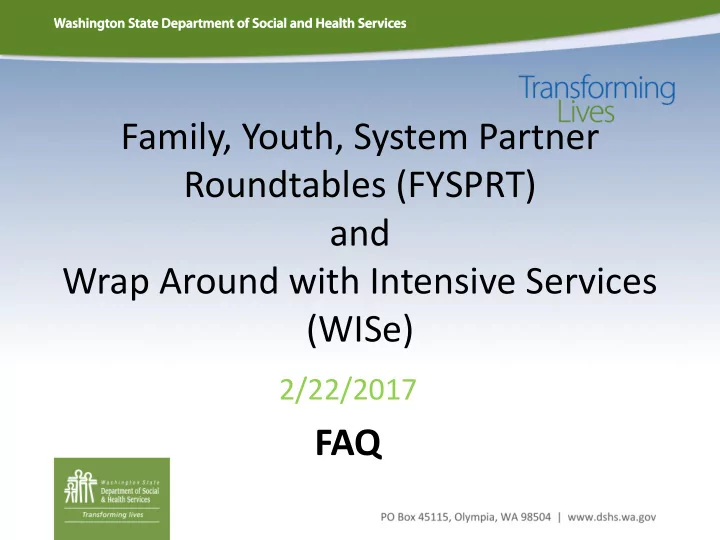

Family, Youth, System Partner Roundtables (FYSPRT) and Wrap Around with Intensive Services (WISe) 2/22/2017 FAQ
What is a FYSPRT? • FYSPRT stands for Family Youth System Partner Round Table • FYSPRTs create a platform for family, youth and system partners to – collaborate, listen, and – incorporate the voice of the community into decision making at the state level.
What is a FYSPRT FYSPRTs are based on the core values of System of Care, which are: • Family and youth driven services; • Cross-system collaboration; • Community based; and • Culturally and linguistically competent services.
What is a FYSPRT • FYSPRTs are a critical part of the Governance Structure that includes family, youth and system partner voice. It is a required element of the TR Settlement Agreement* agreed on by the plaintiffs and Washington State to inform children’s behavioral health system change.
What is the Vision of FYSPRT? Through respectful partnerships: Families, youth, systems, and communities collaborate, influence, and provide leadership to address challenges and barriers. FYSPRTs work to promote cohesive behavioral health services for children, youth and families in Washington State.
What is the Mission of the FYSPRT? The Washington State Family, Youth and System Partner Round Tables provide an equitable forum for families, youth, systems, and communities to strengthen sustainable resources by providing community-based approaches to address the individualized behavioral health needs of children, youth and families.
Question: How can the FYSPRT support community needs of: 1. Youth 2. Family 3. System Partners
Answer: FYSPRTs support the community needs of youth, family, and system partners through collaboration, listening, and resource sharing. FYSPRTs provide a forum to make connections with others in the community, offering validation and hope.
What happens at a FYSPRT Meeting? • You can expect a safe, collaborative, welcoming environment to share your thoughts, voice, and listen and learn from others. • It is a place where different perspectives can come together to build relationships and develop suggestions for ways to make things work better. • You can propose topics to add to the current meeting agenda and/or to a future meeting agenda that addresses a need or needs important to your community.
How do FYSPRTs make a difference? • FYSPRTs make a difference by welcoming the voice of youth, family and system partners in sharing strengths and needs regarding mental health services for youth. Information and feedback discussed at FYSPRTs have the potential to initiate and influence system-wide change at the local/regional level.
What is my role? How might I fit? Each person coming to the table brings a unique perspective, please check out a meeting to explore how you fit it.
Where can I get more information about FYSPRTs? http://wabhwc.com/fysprt
Wraparound With Intensive Services (WISe) WISe is a voluntary service that takes a team approach to meeting your child’s needs. It provides intensive mental health services to support your child and helps your family reach your goals.
Who Can Receive WISe? WISe is available to Medicaid eligible children/youth from birth to age 21 that meet Access to Care Standards (standards used by mental health agencies to get the right level of services to individuals).
The Focus of WISe is… To provide intensive mental health services designed to assist children/youth and their family in achieving wellness, safety, and to strengthen relationships within your community.
The Focus of WISe is… • To develop an individualized care plan, based on strengths and needs that respect the families culture, values, norms, and preferences. • The child and the family guide and drive the plan using a team. • Team members include natural supports (such as family, friends, and religious leaders) and the professionals who work with the family (such as counselors, schools, CPS, and probation officers).
The Focus of WISe is… • To offer services and supports in locations and at times that work best for the child/youth and family (including in their home or a public location of choice, and on evenings or weekends). • To identify or provide resources and supports to the child/youth and family.
The Focus of WISe is… To provide help during a time of crisis. • Families have access to crisis services for their child/youth any time of the day, 365 days a year. • Crisis services are provided by individuals who know the child/youth and family’s needs and circumstances, as well as their current crisis plan. • Whenever necessary, this includes face-to-face interventions at the location where the crisis occurs.
When Will WISe be Available in my Community? WISe is rolling out across Washington through June 2018; therefore it may not be available yet in your part of the state. Referrals for a WISe screen can be made at any time in counties that have implemented WISe.
When Will WISe be Available in my Community? To find out if WISe is available where you live and who to contact go to: https://www.dshs.wa.gov/bha/division- behavioral-health-and-recovery/wraparound- intensive-services-wise-implementation and Click on the “ WISe Referral Contact List by County” document.
Presented by: Patty King, Family Liaison Division Of Behavioral Health and Recovery kingp1@dshs.wa.gov 360-725-3781
Recommend
More recommend